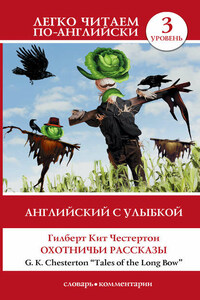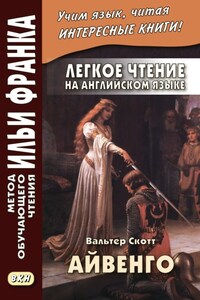In that beautiful part of England where flows the river Don[1] there was in ancient times a large forest, where lived famous bandits. Their adventures have been described in many English ballads.
This is our scene. The date of our story refers to a period towards the end of the reign of Richard I,[2] who was still in prison in a foreign country, while his subjects were oppressed in every possible way. The nobles had become powerful, and each one of them wanted to have a castle and an army.
Four generations since the Conquest by Duke William of Normandy[3] had not been enough to make one people out of the victors Normans and the defeated Anglo-Saxons. After the battle of Hastings[4] the power had been completely placed in the hands of the Norman nobility, and almost all of Saxon princes and nobles had been destroyed.
Two men were walking slowly in the forest with a herd of pigs before them. The swineherd was grim and silent. His thick hair had a rusty dark-red colour and around his neck he had a brass ring like a dog’s collar. On this necklace there was the following inscription – “Gurth, the son of Beowulph, is a born slave of Cedric of Rotherwood.”[5] His companion was a jester named Wamba. They both belonged to one man and were on their way home. “Listen,” said Gurth, “a terrible storm is raging within a few miles of us, don’t you hear the thunder? Let’s get home before it gets here.”
A group of horsemen overtook them on the road. There were ten men; the two who rode the first seemed to be important persons. One of them was obviously a member of the church of a high rank – he was a monk, but his clothes were very expensive. He was accompanied by two other monks and two servants.
The companion of the monk was a man past forty, thin, strong, tall, and muscular. His face was tanned because of the tropical sun. His piercing dark eyes told in every glance that he had seen much danger. He wore a long monastic cloak and armour underneath it. On his right shoulder there was a white cross. On one side of the saddle there was a short battle-axe, on the other – the rider’s helmet with a long sword. His squires held his lance and a small triangular shield. These squires were followed by two servants, dark-skinned, with white turbans and Eastern dress. They had silver collars round their throats, and bracelets of the same metal upon their arms and legs. The knight and his followers looked wild and foreign.
Gurth knew the monk. It was the Prior of Jorvaulx Abbey, well known for many miles around as a lover of hunting and banquet. He was from a distinguished Norman family and was friends both with the younger and older aristocrats. He knew little, but it was enough to make an impression, and the high tone which he used in promoting the authority of the church made people believe he was a saint. He was generous and spent the money of his Abbey not only on himself but also on poor peasants. The Saxons bowed.
“My children,” said the Prior, “is there in this neighbourhood any good man, who, for the love of God, and devotion to Mother Church,[6] will give two of her servants a night’s hospitality?”
The armed rider added: “Tell us, if you can, the road to—how did you call your Franklin,[7] Prior Aymer?”
“Cedric,” answered the Prior; “Cedric the Saxon. – Tell me, good fellow, are we near his mansion, and can you show us the road?”
“The road will be uneasy to find,” answered Gurth, “and the family of Cedric go to bed early.”
“Hush,” said the Abbot, “do not speak with this reverend brother like that. He has spent his life fighting the Saracens[8] to recover the Holy Sepulchre;[9] he is of the order of Knights Templars.[10] He is half a monk, half a soldier.”
“Well, then,” answered Wamba, “you should go on this road until you come to a cross, then take the road to the left and I believe you will have shelter before the storm comes on.”
The cavalcade rode on, and Gurth said to his companion, “If they follow your wise direction, the reverend fathers will hardly reach Rotherwood this night.”
“No,” said the Jester, smiling, “but they may reach Sheffield if they have good luck, and that is a good place for them.”
“You are right,” said Gurth; “it would be bad if that Aymer saw the Lady Rowena; and it would be worse for Cedric to have a quarrel, as he most likely would, with this military monk.”
In the meanwhile the riders talked on their way.
Prior Aymer said: “Remember what I told you: this wealthy Franklin is proud, fierce, jealous, and easy to irritate, he can stand against the nobles, even his neighbours, Reginald Front-de-Boeuf and Philip Malvoisin, who are no babies to fight with. He stands up so proudly for the privileges of his people that he is universally called Cedric the Saxon.”
“Then I expect much beauty in this famous Rowena to reward me for being polite with such a man as her father Cedric,” said the Templar.
















